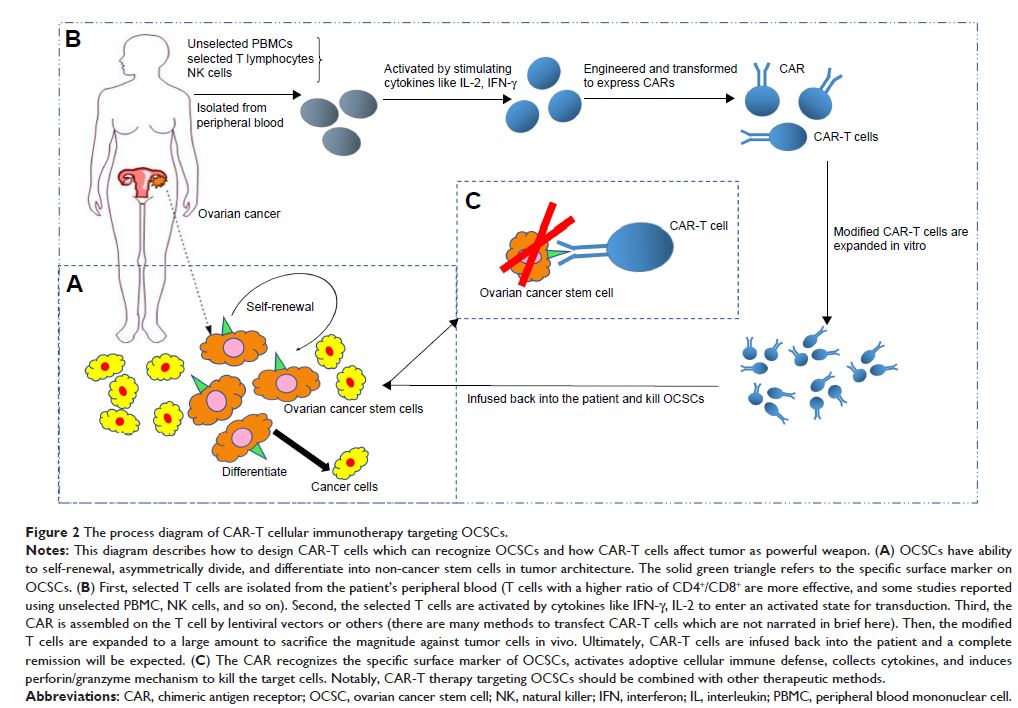108985
论文已发表
注册即可获取德孚的最新动态
IF 收录期刊
- 3.4 Breast Cancer (Dove Med Press)
- 3.2 Clin Epidemiol
- 2.6 Cancer Manag Res
- 2.9 Infect Drug Resist
- 3.7 Clin Interv Aging
- 5.1 Drug Des Dev Ther
- 3.1 Int J Chronic Obstr
- 6.6 Int J Nanomed
- 2.6 Int J Women's Health
- 2.9 Neuropsych Dis Treat
- 2.8 OncoTargets Ther
- 2.0 Patient Prefer Adher
- 2.2 Ther Clin Risk Manag
- 2.5 J Pain Res
- 3.0 Diabet Metab Synd Ob
- 3.2 Psychol Res Behav Ma
- 3.4 Nat Sci Sleep
- 1.8 Pharmgenomics Pers Med
- 2.0 Risk Manag Healthc Policy
- 4.1 J Inflamm Res
- 2.0 Int J Gen Med
- 3.4 J Hepatocell Carcinoma
- 3.0 J Asthma Allergy
- 2.2 Clin Cosmet Investig Dermatol
- 2.4 J Multidiscip Healthc

卵巢癌干细胞是创新性免疫疗法的目标吗?
Authors Wang L, Xu T, Cui M
Received 28 October 2017
Accepted for publication 26 February 2018
Published 8 May 2018 Volume 2018:11 Pages 2615—2626
DOI https://doi.org/10.2147/OTT.S155458
Checked for plagiarism Yes
Review by Single-blind
Peer reviewers approved by Dr Justinn Cochran
Peer reviewer comments 2
Editor who approved publication: Prof. Dr. Geoffrey Pietersz
Abstract: Cancer stem cells
(CSCs), a subpopulation of cancer cells with the ability of self-renewal and
differentiation, are believed to be responsible for tumor generation,
progression, metastasis, and relapse. Ovarian cancer, the most malignant
gynecological cancer, has consistent pathology behavior with CSC model, which
suggests that therapies based on ovarian cancer stem cells (OCSCs) can gain a
more successful prognosis. Much evidence has proved that epigenetic mechanism
played an important role in tumor formation and sustainment. Since CSCs are
generally resistant to conventional therapies (chemotherapy and radiotherapy),
immunotherapy is a more effective method that has been implemented in the
clinic. Chimeric antigen receptor (CAR)-T cell, an adoptive cellular immunotherapy,
which results in apparent elimination of tumor in both hematologic and solid
cancers, could be used for ovarian cancer. This review covers the basic
conception of CSCs and OCSCs, the implication of epigenetic mechanism
underlying cancer evolution considering CSC model, the immunotherapies reported
for ovarian cancer targeting OCSCs currently, and the relationship between
immune system and hierarchy cancer organized by CSCs. Particularly, the
promising prospects and potential pitfalls of targeting OCSC surface markers to
design CAR-T cellular immunotherapy are discussed here.
Keywords: cancer stem
cells, ovarian cancer, epigenetics, tumor cell surface marker, immunotherapy,
CAR
